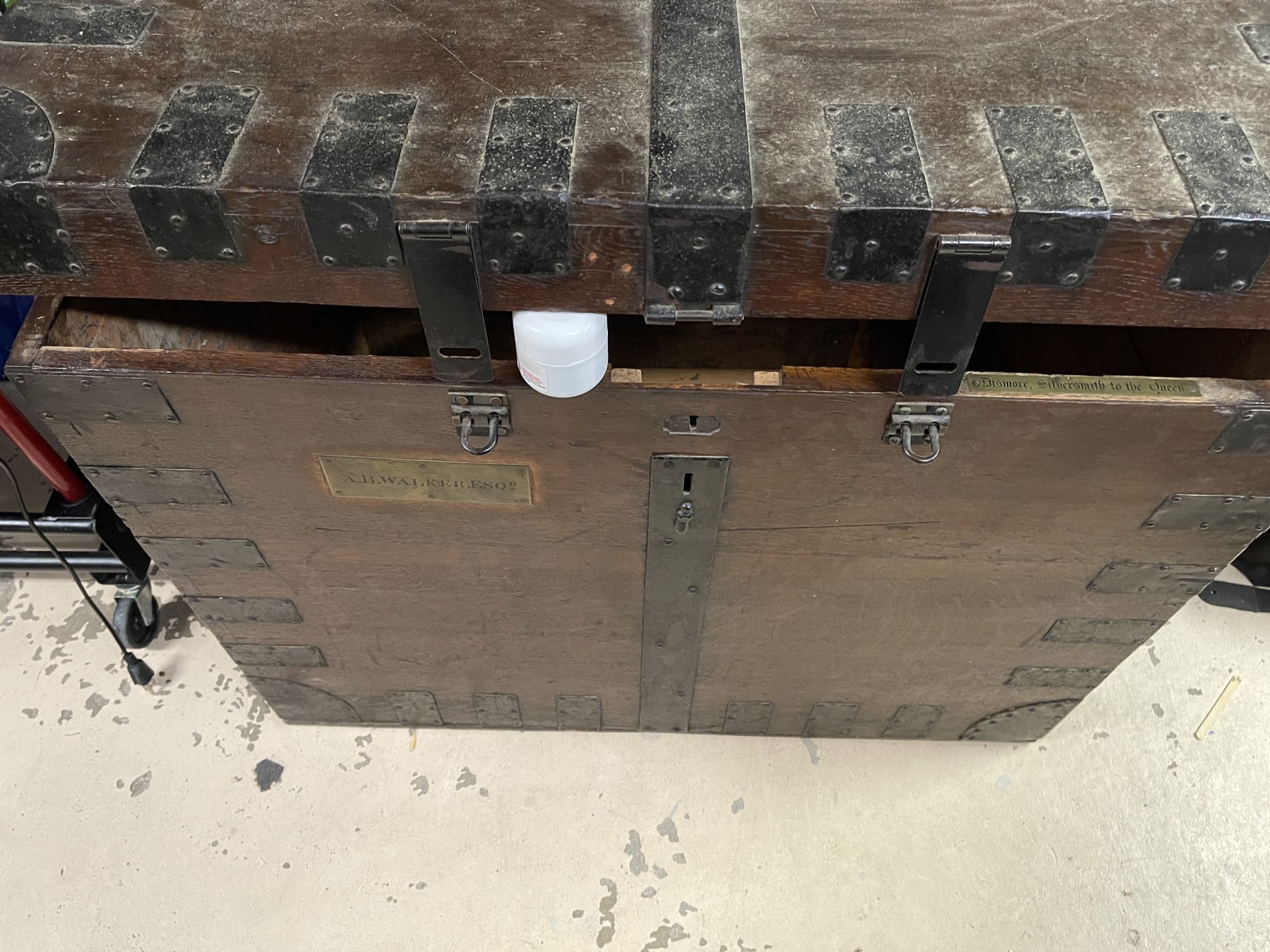Antique Trunk
$1,000
Last updated about 2 years ago in Apopka, FL
Condition: Used (normal wear)
Listed in categories: Collectibles & Art - Antiques
Sold by

Additional images
Details
- Type
- Victorian
Description
MarcusP423 Appraiser . I lived in Liverpool for a few years as a student, and my great grandfather was born in a small town just outside the city. Not relevant really, but just thought I'd mention it! * Yes, three photos of a very sturdy-looking trunk, with the reference to "Dismore, silversmith to the Queen", which I take to be a reference to Thomas Dismore, who was a jeweller in Bold Street, Liverpool, but with offices also in London. I'll see what more I can find out about him and his business, which shouldn't be too difficult, as he was a well-known silversmith. The brass plaque on the front, to A B Walker Esq, is a little more vague. I have full access to the National Archives here in the UK, so will see if I can find a gentleman of that name and initials from the correct period. The box itself would have been made by Dismore to contain Walker's "family silver", possibly at the time he emigrated to the States. . I have managed to find out quite a lot about "Dismore, silversmith to the Queen", and the history goes quite some way back, to the late 18th century. The first Dismore silversmith was Thomas Spicer Dismore, born in 1787, and a resident of Southwark in London. He was an apprentice engraver before becoming a silversmith in his own right, registering his first "marks" with Goldsmith's Hall around 1820. In the 1830s he was joined in the business by his third son George (born 1811) and they began trading as Thomas Dismore & Son in 1848. George died in 1875, aged 64, and Thomas, died four years later, aged 92 - a significant age for any man in Victorian England, and indicative of a successful business and a healthy lifestyle. When both died, the executor to the will was cited as another Thomas Dismore, named as a jeweller of Bold Street, Liverpool. Further research reveals that this was actually Thomas's second son, born in Cripplegate, London, in 1807 – older than George by four years. (There was another son, John, born 1805, who died young, and two daughters). The two branches of the family worked closely, and from around 1840, Thomas Dismore (London) had been supplying his son Thomas in Liverpool with "Superior Quality Plate" and "Silver Mounted Plated Goods". Given the date, these "Plated Goods" would have been mostly Sheffield Plate, not electro-plate, which wasn't invented until the 1840s by Elkington's of Birmingham, and not widely adopted by other silversmiths until the 1850s, of which Dismore was clearly among one of the first. * MarcusP423 Appraiser It was at around this time that Thomas Dismore (Liverpool) laid claim to being "Silversmith and Jeweller to The Queen and The Prince Albert". The first reference to this elevated status occurs in 1840, when an announcement in the Liverpool Mail states: "Thomas Dismore. Manufacturing Silversmith and Jeweller to her Majesty, Respectfully informs the Nobility, Gentry, and Exporters of this Port, that they can be supplied with the best London-made Articles at the same prices charged London." It must have worked, because, in May 1849, Thomas upped sticks and moved from 35 Bold Street "to more commodious premises, No. 2, Bold Street, where he has increased Stock of Superior Silver Plate, Jewellery, Sheffield and Electric Plate, Watches &c., &c.," Quite how Thomas came to claim his "Appointment to Her Majesty" isn't clear, and prior to about 1885, it wasn't strictly regulated. It may have been that Thomas, by chance, sold an item of jewellery to Queen Victoria, and took it upon himself to claim the warrant. I can find no evidence that it was ever officially awarded. His advert the following year, 1850, was even larger, and promoted the Bold Street shop as being an establishment where "a very superior stock of Silver Plate, Electro and Sheffield Plate, Jewellery, Watches &c., &c.," could be perused. The advert also says that, as well as being a manufacturer in his own right, he has the "advantage of a daily communication with the Manufactory in London", which would be his father's business, linked by the railway. In the 1881 census, Thomas is still running the shop, aged 73. In 1882 tragedy struck the Liverpool family, when when Thomas's only son, Thomas George, a lawyer, was killed in a climbing accident on Mount Snowdon, in North Wales, on 20th August. He was 35, and had never married. Within the month, Thomas himself died, and the business closed. $1000 obo
Save, Report, and Share
Item location map
Map is approximate to keep seller’s location private.
Related searches
- Antique dresser
- Antique furniture
- Antique desk
- Antique table
- Antique mirror
- Antique clocks
- Antique chairs
- Antique cabinets
- Antique bottles
- Antique armoire
- Antique lamps
- Antique dolls
- Antique china
- Antique glass
- Vintage lamp
- Vintage pyrex
- Candelabra